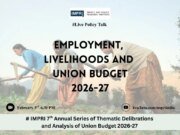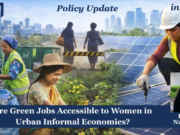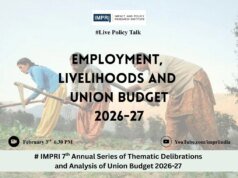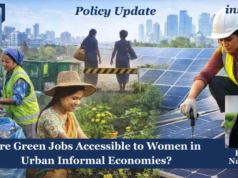Sreeja Mukherjee
The Invisible Voters: My Research Journey.
When we speak of India’s democracy—the world’s largest—we often celebrate its scale and resilience. Yet, as I discovered through my fieldwork in Sonagachi , India’s most prominent red-light district, this celebration rings hollow for many women sex workers who remain politically marginalized despite constitutional guarantees of universal adult franchise.
My research journey began with a fundamental question: How do intersecting vulnerabilities of gender, occupation, and social stigma impact the electoral participation and political empowerment of women in sex work? What I uncovered was a complex landscape of exclusion, resilience, and gradual transformation that challenges our understanding of democratic inclusivity.
Grassroots Revolution: The DMSC Model.
The Durbar Mahila Samanwaya Committee (DMSC) in Sonagachi emerged as a powerful example of how grassroots organizing can bridge the gap between marginalized communities and democratic institutions. Led by former sex workers, DMSC has facilitated remarkable achievements: mass voter registration drives, establishment of over 300 bank accounts with the State Bank of India, and perhaps most significantly, securing recognition of “sex worker” as a valid occupation for official documentation.
What makes DMSC’s approach particularly effective is its holistic vision of empowerment. Rather than treating electoral participation as isolated from other aspects of life, they recognize that political voice is interconnected with financial inclusion, healthcare access, and social dignity. Their partnership with Usha Cooperative provides microfinance services that address economic insecurity, while their comprehensive health initiatives—including successful COVID-19 management—build community resilience.
“We are citizens first, before anything else,” a DMSC leader told me. “Without voter cards and political representation, we remain invisible to those who make decisions about our lives.”
The Documentation Dilemma:
Across the red light area of Sonagachi, lack of identification documentation emerged as the most significant practical barrier to electoral participation. The bureaucratic requirement for proof of residence presents a nearly insurmountable challenge for women whose very existence is often deliberately kept off official records.
As one respondent explained: “How can I provide proof of residence when my landlord doesn’t give receipts? He fears legal complications because of my work.”
This challenge is being addressed through innovative solutions by electoral officers. In North Kolkata, the District Election Office has implemented a minimal documentation approach, accepting self-attested address proofs. Booth Level Officers (BLOs) have adapted requirements to accommodate the community’s unique circumstances, demonstrating how bureaucratic flexibility can enhance democratic inclusivity.
The Intersectional Reality:
My research confirmed that electoral exclusion of women sex workers cannot be understood through a single-factor analysis. The barriers they face represent a complex intersection of gender discrimination, occupational stigma, economic marginalization, and institutional bias.
A particularly revealing finding was how mobility challenges affect electoral participation. Women in sex work frequently relocate due to various pressures—police harassment, debt, health issues, or family circumstances. This high mobility disrupts their ability to establish residency required for voter registration or to cast ballots in constituencies where they’re registered.
In response, electoral offices have implemented flexible voter card transfer processes, though awareness of these options remains limited within the community.
Institutional Innovations:
The Chief Electoral Officer’s office in Kolkata has developed comprehensive strategies focusing on community engagement through partnerships with organizations like DMSC. Their implementation of gender-sensitive infrastructure at polling stations—including women-led model polling stations and crèche facilities—addresses practical barriers to voting day participation.
The January 2025 “Chunav Pathshala” (Election School) sessions conducted at three locations in Sonagachi demonstrated both the potential and challenges of electoral education initiatives. While attendance varied, these sessions provided crucial information about voter registration procedures and forms. The most successful approaches emphasized digital literacy and interactive learning in vernacular language.
Beyond Tokenism: Toward Substantive Representation.
What became clear through my research is that mere procedural inclusion is insufficient. Women sex workers seek not just the right to vote but meaningful representation that addresses their specific concerns and lived experiences.
“Politicians come only during elections, promising everything but delivering nothing,” noted a longtime resident of Sonagachi. “We need representatives who understand our daily struggles with police harassment, healthcare access, and our children’s education.”
This highlights the distinction between formal inclusion and substantive representation—a gap that requires addressing not just electoral mechanics but deeper societal attitudes toward sex work and women’s political agency.
The Path Forward:
My research suggests three interconnected pathways toward greater electoral inclusivity:
- Targeted interventions for socio-economic vulnerabilities: Strengthening initiatives like DMSC’s Usha Cooperative that address the economic precarity underlying political marginalization.
- Enhanced electoral awareness through community engagement: Expanding Chunav Pathshala initiatives with culturally relevant activities and regular, structured schedules that build trust and knowledge.
- Multi-stakeholder collaboration: Fostering sustained partnerships between electoral authorities, NGOs, and community leaders to develop context-specific solutions.
Democracy’s Unfinished Promise:
As India continues to strengthen its democratic institutions, the experience of women sex workers serves as both a critique and an opportunity. Their systematic exclusion reveals the gaps in our democratic practice, while grassroots initiatives like DMSC demonstrate pathways toward more inclusive political participation.
What my research ultimately reveals is that electoral inclusivity for marginalized women requires more than technical fixes to voter registration. It demands recognition of their full citizenship, respect for their agency, and institutional responsiveness to their lived realities. Only then can India’s democracy truly fulfill its promise of equal participation and representation for all citizens.
As one DMSC community mobilizer powerfully stated: “We don’t want special treatment. We want what is already our right as citizens—a voice in the decisions that shape our lives.”
This blog is based on field research conducted in Sonagachi, as part of a study on intersectional barriers to electoral inclusivity and political empowerment of marginalized women in Indian democracy.
About the contributor: Sreeja Mukherjee is a fellow at YWLPPF Young Women Leaders in Public Policy Fellowship 2.0 at IMPRI and holds a Masters in Applied Mathematics from IIEST, Shibpur and pursuing a Masters in International Electoral Management and Practices at TISS, Mumbai.
Disclaimer: All views expressed in the article belong solely to the author and not necessarily to the organisation.
Read more at IMPRI:
Infertility Paradox: Falling Total Fertility Rate Despite High Population Growth
India’s Urban Development: From central control to local needs
Acknowledgment: This article was posted by Bhaktiba Jadeja, visiting researcher and assistant editor at IMPRI.



















